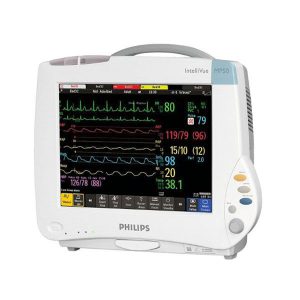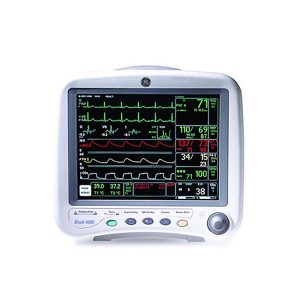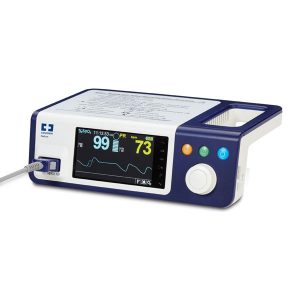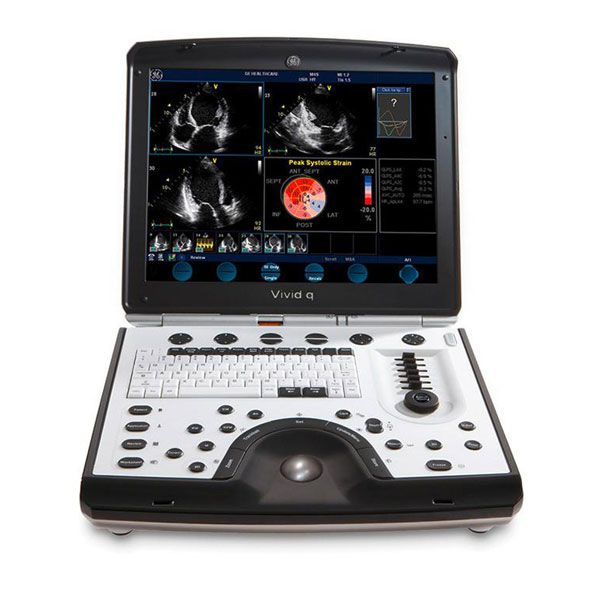GE Dash 5000
Certified Refurbished Medical Equipment!
GE Dash 5000
Designed for optimized monitoring in all care applications
Advanced algorithms for all monitored parameters
Fully flexible alarm settings allow personalized monitoring
ECG acquisition through cables or wireless
Bright alarm light at the bedside helps to immediately locate the patient in critical situations
Multiple mounting solutions and a wide range of accessories ensure easy and flexible workplace configuration
3 waveform screen view to maximizing the size of parameter values and waveforms
Convenient care area-specific Remote iTouch Pad enables operation on both sides of the patient’s bed and direct access to frequently used functions
GE Dash 5000 Features
Designed for optimized monitoring in all care applications
Advanced algorithms for all monitored parameters
Fully flexible alarm settings allow personalized monitoring
ECG acquisition through cables or wireless
Bright alarm light at the bedside helps to immediately locate the patient in critical situations
Multiple mounting solutions and a wide range of accessories ensure easy and flexible workplace configuration
3 waveform screen view to maximizing the size of parameter values and waveforms
Convenient care area-specific Remote iTouch Pad enables operation on both sides of the patient’s bed and direct access to frequently used functions
Remote Screen through DashPort2 for an optimal central overview
CO2 module and extension Rack for additional parameters
The wide array of interfacing options with iConnect solutions
Both mainstream and low-flow sidestream CO2 measurement options for applications from neonatal to adult patients
GE Dash 5000 Specifications
Display
Size Dash 3000 – 8.4 in., Dash 4000 – 10.4 in., Dash 5000 – 12.1 in.
Type Active-matrix color LCD
Resolution Dash 3000 and 4000: 640 by 480 dpi, Dash 5000: 800 by 600 dpi • Number of traces 7 (maximum)
Number of seconds/trace 4.9 at 25 mm/sec
Sweep speed 6.25, 12.5, 25 mm/sec (with erase bar)
Controls
TrimKnob® control
Five hard keys Standard Silence Alarm, Print, NBP Go/Stop, Zero All and Power On/Off. Dash 5000 adds
Trends, NBP Auto, Admit/Discharge, Standby and Main View
Remote control option Available
Alarms
Categories Patient status and system status
Priority 4 levels – Crisis, Warning, Advisory and Message
Notification Audible and visual
Setting Default and individual
Silencing 1 minute, the current alarm only
Pause 5 minutes in Adult ICU mode, 3 minutes in Neonatal ICU mode and 5 minutes,
15 minute, or permanent pause in OR mode
Volume Default 70 dB measured at 1 meter
Invasive blood pressure
Number of channels 1 to 4 (optional)
Transducer sites Arterial, femoral artery, pulmonary arterial, central venous, right atrial, left atrial, intracranial and special
Transducer requirements Excitation voltage: 5 V dc ± 0.1%
Transducer output 5 μV/V/mmHg
Input specifications
Range -25 mmHg to 300 mmHg
Offset ± 150 mmHg
Output specifications
Frequency response dc to 50 Hz (-3 dB)
Zero balance range ± 150 mmHg
Zero balance accuracy ± 1 mmHg
Zero balance drift ± 1 mmHg over 24 hours
Accuracy ± 2% or ± 1 mmHg, whichever is greater
(exclusive of the transducer)
Alarms User-selectable upper and lower limits for systolic, diastolic and mean pressures
Pacemaker detection / rejection
Input voltage range ± 2 mV to ± 700 mV
Input pulse width 0.1 ms to 2 ms
Rise time 10 μs to 100 μs
Over/undershoot 2 mV (max)
Baseline drift < 0.5 mV per hour with a ± 700 mV, 2 ms Pacemaker pulse AppliedRespiration Measurement technique Impedance variation detection Range 0-200 breaths per minute for variations of 1.0 – 10.0 Ω Respiration rate 0-200 breaths per minute Base impedance 100-1000 Ω at 52.6 kHz Detection sensitivity 0.4 to 10 Ω variation Waveform display bandwidth 0.1 to 1.8 Hz (-3 dB) Alarms User-selectable upper and lower respiration rate limits, and user-selectable apnea limit








There are no reviews yet.